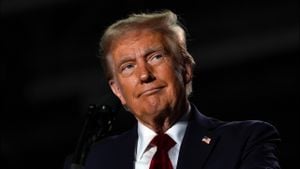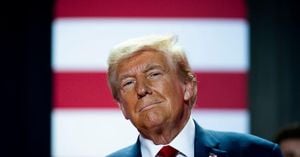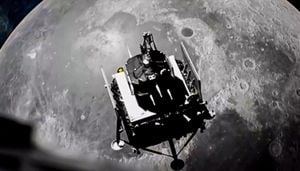The return of Donald Trump to the forefront of American politics has set the stage for significant shifts and consequences, both domestically and on the global front. After winning the U.S. presidential election once again, Trump’s influence is palpable as he assembles what he calls his "Cabinet of Curiosities," drawing attention from both supporters and critics alike.
At the heart of Trump's reinvigorated political presence is his recent meeting with President Biden, which showcased not just the expected politicking but also the entertainment value typical of their public battles. The encounter was parodied on Saturday Night Live, where Trump, amusingly played by James Austin Johnson, boasted about his cabinet choices, evoking imagery of chaotic celebrity politics. High-profile nominees announced by Trump include controversial figures such as Kristi Noem and Matt Gaetz, raising eyebrows as they symbolize the unusual blend of celebrity and politics prevalent today.
Meanwhile, Trump's nomination of Robert F. Kennedy Jr. as Secretary of Health and Human Services has sparked significant debate. Known for his controversial views, Kennedy's impending ascension to this pivotal role reflects Trump's strategy to blend traditional governance with provocative personalities. Jostling for attention within the administration feel like adds for lofty campaign promises, leaving many to wonder if governance will take on the same irreverence seen during Trump's previous term.
This amusement at the absurdity of it all is amplified by standout moments from S.N.L. During the show, the characters were quick to highlight Trump's wild cabinet choices, which were intentionally framed for comedic effect as one candidate suggested they were among “the most dynamic, free-thinking, animal-killing, sexually criminal, medically crazy people” to lead the nation. These segments resonate with the public as they blur lines between entertainment and political commentary.
And here’s the crux: Trump’s message and persona have persisted, galvanizing his base even as triggering skepticism among critics. His ability to captivate and polarize audiences is evident, with social media platforms becoming battlegrounds for ideological and partisan divides. Notably, discussions about Trump's policies and rhetoric have taken global stages, leading political aficionados to question the ramifications—for both U.S. and international relations.
Analysis of Trump's past foreign policy suggests potential shifts if he returns to presidency. Foreign partners and adversaries alike are bracing for what could be another round of unpredictability. Will alliances strengthen, or will tensions escalate anew? Economic ramifications loom, with allies perhaps second-guessing their position relative to U.S. interests, and nations like China or Russia preparing for shifts they have seen before. This climate plays precariously against the backdrop of climate change, trade negotiations, and military engagements.
One cannot overlook how Trump’s handling of domestic policies aligns with international perceptions. His approach to climate change policies and relations with other nations—a shift back to energy independence versus global cooperation—are key indicators of the path the U.S. might find itself on again. Observers argue the stakes for imminent changes climb higher with every appointment, especially those heralding significant reversals from the preceding administration.
Global conversations are beginning to reflect this uncertainty as well; leaders from various countries express concern over U.S. stability and predictability under Trump’s leadership. They worry about potential shifts away from multilateralism, which has been the cornerstone of international cooperation. Shifting trade policies, the potential for renewed tariffs, or aggressions like those seen during Trump's first term could hinder global economic growth going forward.
At the same time, there is excitement among Trump's supporters. Many believe his policies favor U.S. interests, promote job creation, and safeguard national security. This political moment also opens up debates about individual liberties versus governmental control, where Trump’s trademark populism continues to thrive. His rhetoric, revolving around “America First,” resonates and finds footing among discontented segments of the population searching for cordoned-off individuality within the larger narrative.
Reflective of such opinions, polls show Trump retains considerable support among Republican base voters. With the 2024 election looming, each decision he makes, from cabinet appointments to policy proposals, is being watched closely. Will these moves solidify his place securely within the party, or drive away independent voters still on the fence? Some experts suggest this whole dynamic could lead to fragmentation within the GOP—one side yearning for traditional conservatism and the other advocating Trump's more populist platform.
International observers have taken stock of these movements and reshuffles, anticipating reactions from regional allies and foes. Experts are wary of potential distractions and internal strife, which often accompany Trump's bold posturing. With foreign alliances under scrutiny, nations are leaning toward strained evaluations of their stances on key issues. Political analysts highlight interplays of domestic turmoil and foreign diplomacy as being of high priority over the next few years.
The need for clearer communication from the U.S. government emerges as pivotal. Shedding light on foreign policy intentions serves not only to assure allies but also to keep enemies at bay, assuring stability where it may have previously faltered. The question remains: how will the U.S. rebuild international trust? Can traditional ties withstand the tumultuous wave of Trumpism?
Critics argue the stakes couldn’t be higher, with geopolitical landscapes shifting beneath large personalities overshadowing calculated diplomacy. Some allies are cleverly positioning themselves for possible shifts, examining past relations, assessing the potential impacts of such new dynamics, and strategizing their own engagements accordingly. Expect increased dialogues and initiatives among nations as they hope to align with whatever direction the U.S. charts forward.
Meanwhile, protests and public gatherings have surged as homegrown reactions to the sought-after political climate evolve. Comparisons between policies and officials from Trump’s prior tenure and Hillary Clinton's vision call for reflections from those supporting and opposing Trump. Questions abound as to whether true alignment can be achieved, or if divisions will only deepen as perspectives progress.
What’s undeniable, though, is the burgeoning fascination with Trump’s resurgence on the political scene. Both the supporters and critics remain intensely activated, no longer just passive observers of the political dance. The excitement leads to analysis and discussion, imbuing political discourse with urgency. Social media platforms continue to provide forums for debate, with hashtags and trending topics generating dialogues worldwide.
Trump’s return invariably ignites fierce debates about governance, identity, and future aspirations. Each twist and turn as he shapes his narrative on the national stage will illuminate fundamental issues the country grapples with today. The intertwined stories of major domestic happenings and global foreign relations beckon political aficionados to sift through the noise for the real design of the times.
Whether it leads to newfound cooperation, insightful discourse, or confrontation remains to be seen. Yet, all evidence points to the fact—politics, much like comedy, thrives on unpredictability, and with Trump back as the main act, the world is bracing for another enthralling season.



